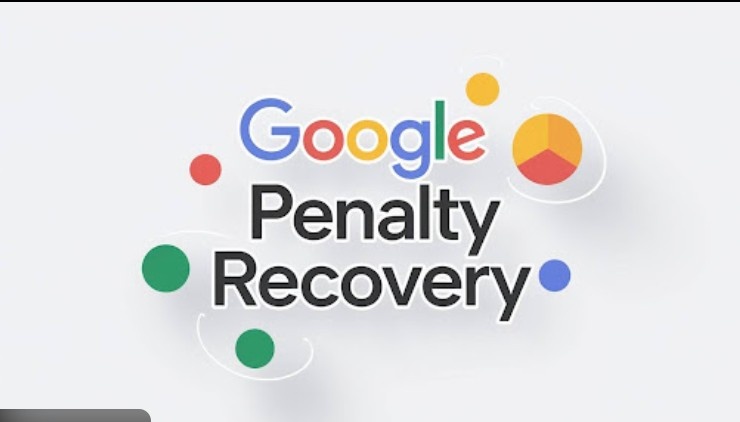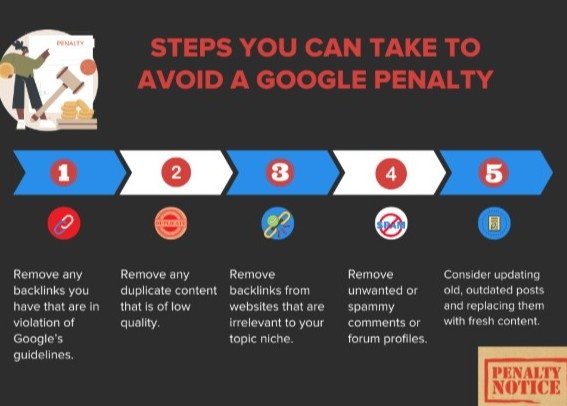Table of Contents
ToggleWhat is a Google Penalty and How to Recover From It
Google is the backbone of online search, and ranking high in Google search results is vital for any business. But sometimes, websites lose traffic or rankings suddenly. One common reason is a Google penalty. Understanding what a Google penalty is, its causes, and how to recover from it is crucial for maintaining your website’s visibility and attracting new customers specially for businesses .

What is a Google Penalty?
A Google penalty is a punishment applied to a website that violates Google’s Webmaster Guidelines. Penalties can negatively impact a site’s ranking in search results, reduce organic traffic, and ultimately affect revenue.
Google penalties fall into two main categories:
1. Manual Penalties
Manual penalties occur when Google’s human reviewers identify that a website is engaging in practices that violate guidelines. Examples include:
- Buying or selling links to manipulate PageRank
- Publishing thin or duplicate content
- Using cloaking or sneaky redirects
Webmasters can check if their website has a manual penalty through Google Search Console under the “Manual Actions” section.
2. Algorithmic Penalties
Algorithmic penalties happen automatically when Google’s algorithms detect issues. Popular algorithms like Penguin and Panda can affect rankings if your website:
- Has low-quality or duplicate content
- Contains unnatural backlinks
- Overuses keywords unnaturally
Unlike manual penalties, algorithmic penalties do not trigger notifications in Google Search Console.
Common Causes of Google Penalties
Understanding the reasons behind penalties is the first step toward recovery. Some common causes include:
1. Low-Quality Content
Websites with thin, duplicate, or irrelevant content often get penalized. Google rewards content that is unique, informative, and valuable to users. For tips on creating high-quality content that avoids penalties, check out Proven On-Page SEO Techniques to Boost Your Rankings.
2. Unnatural or Spammy Backlinks
Backlinks from irrelevant or low-authority websites can trigger algorithmic penalties. Buying links, participating in link schemes, or using automated link-building tools increases the risk.
3. Keyword Stuffing
Overloading a page with keywords in headings, paragraphs, or meta tags can harm rankings. Google favors natural, readable content.
4. Cloaking and Sneaky Redirects
Cloaking involves showing different content to search engines and users. Sneaky redirects send users to different pages than what appears in search results. Both violate Google guidelines.
5. Hidden Text and Links
Using hidden text or links (e.g., white text on a white background) is considered manipulative and can trigger penalties.
How to Identify a Google Penalty
Before recovery, you must determine if your website has been penalized. Signs include:
- Sudden drop in organic traffic
- Keywords disappearing from Google rankings
- Drop in domain authority
- Receiving a Manual Action notification in Google Search Console
You can also use tools like:
- Google Analytics: Monitor sudden traffic drops
- Ahrefs or SEMrush: Identify unnatural backlinks
- Google Search Console: Check for penalties or warnings
Steps to Recover from a Google Penalty

Recovery requires a structured approach. Follow these steps:
Step 1: Identify the Type of Penalty
- Check Google Search Console for manual actions.
- Analyze traffic patterns to spot algorithmic penalties. For a detailed guide on recovering from Google updates and algorithmic penalties, visit Recovering from Google Updates.
Step 2: Conduct a Comprehensive Website Audit
Audit your website thoroughly using tools like:
- Screaming Frog for technical SEO issues
- Ahrefs or SEMrush for backlink audits
- Copyscape or Grammarly for duplicate content detection
Step 3: Fix Identified Issues
Depending on the type of penalty, fix:
- Low-quality content: Rewrite or remove thin pages
- Unnatural backlinks: Use the disavow tool to remove harmful links
- Keyword stuffing: Rewrite content naturally
- Technical issues: Correct cloaking, redirects, and hidden elements
Step 4: Submit a Reconsideration Request
For manual penalties, submit a reconsideration request in Google Search Console after resolving all issues. Include:
- A detailed explanation of fixes made
- Proof that your website now complies with Google guidelines
Step 5: Monitor Your Website
After recovery, track traffic, rankings, and backlink profile. Tools like Google Analytics and Search Console help ensure your website stays penalty-free.
Preventing Future Google Penalties
Avoiding penalties is easier than recovering from them. Implement these strategies:
1. Focus on High-Quality Content
- Create original, engaging, and informative content.
- Update your content regularly to stay relevant. For professional assistance in creating optimized content and maintaining website SEO, check out SEO Services by Elysian Digital Services
2. Build Natural Backlinks
- Avoid buying links or using link farms
- Guest posts, PR outreach, and content marketing are safe ways to earn backlinks
3. Avoid Black-Hat SEO Practices
- No keyword stuffing
- No hidden text or links
- No cloaking or sneaky redirects
4. Regular Website Maintenance
- Check for broken links, duplicate content, and outdated pages
- Keep your website technically optimized for Google’s algorithms
5. Stay Updated with Google Algorithm Changes
- Follow Google Webmaster Blog and SEO news
Adapt your strategy to Penguin, Panda, and other updates
Local SEO Considerations for Delhi Businesses
Businesses in Delhi, India, must also focus on local SEO to recover from or avoid penalties:
- Include location-specific keywords in titles, meta descriptions, and content
- Optimize Google My Business (GMB) profile
- Encourage customer reviews to boost credibility
- Use local backlinks from trusted Delhi-based websites and directories
Local SEO combined with quality content ensures your business ranks higher in voice search and AI-powered search results.
AI-Friendly SEO Strategies
To make your content AI-friendly:
- Use concise sentences that AI can parse easily
- Include semantic keywords (e.g., “Google ranking drop,” “SEO recovery steps,” “manual action removal”)
- Structure content for featured snippets: Use Q&A, bullet points, and short definitions
- Optimize for voice search: Answer common questions directly at the beginning of sections
Example snippet for voice search:
“A Google penalty is a punishment applied to websites that violate Google’s guidelines. Recovery involves identifying the penalty type, fixing issues, and submitting a reconsideration request.”
Common Questions About Google Penalties
Recovering from a Google penalty is challenging but achievable with the right approach. The key steps include:
- Identifying the type of penalty
- Conducting a thorough website audit
- Fixing content, backlinks, and technical issues
- Submitting a reconsideration request (if applicable)
- Monitoring the website continuously
For businesses in Delhi and across India, professional assistance can speed up recovery and prevent future penalties. Elysian Digital Services offers expert SEO, website audits, and digital marketing solutions to help your business recover from Google penalties, improve rankings, and attract more customers.
With proper guidance, ethical SEO practices, and consistent monitoring, your website can regain its position in search results and thrive online.
Common Questions About Google Penalties
Q1:How long does it take to recover from a Google penalty?
Recovery time depends on the severity of the penalty. Manual actions may take a few weeks after a reconsideration request, while algorithmic penalties can take months.
Q2: Can I prevent Google penalties completely?
Yes. By following ethical SEO practices, publishing quality content, and monitoring your website regularly, you can minimize the risk of penalties.
Q3: What tools help detect penalties?
- Google Search Console
- Google Analytics
- Ahrefs or SEMrush
Copyscape for duplicate content
Q4: Can disavowing backlinks help?
Yes, disavowing harmful or unnatural backlinks is an essential step in recovering from link-related penalties.
